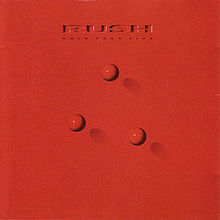 Originally published by L.S. Media. September 8th 2012.
Originally published by L.S. Media. September 8th 2012.
Two albums in a matter of days by the some of the kings of Progressive Rock may have had fans of the genre in apoplexy, a state of progressive nirvana that would see them upbeat about the state and nature of Progressive rock towards the end of the 1980’s. For some the disappointment of Pink Floyd’s A Momentary Lapse of Reasonwas coupled with how Progressive Rock would fare in the brave new world of resurgent electronica music and soap stars becoming music personalities.
Rush’s Hold Your Fire was the 12th studio album by the band and despite poor sales, (for Rush) remains an album of distinction in their long illustrious career, and one of the best that was produced by the band between 1981’s Permanent Waves and Test For Echo in 1996.
What can never be dismissed is the influence that Neil Peart had on the band since he took over as drummer after the departure of John Rutsey. With his inclusion the song writing became almost distinguished, themes of the mystic, legend, myth, political observations and humanity, there was almost nothing that Geddy Lee, Neil Peart and Alex Lifeson could tackle and make interesting.
Hold Your Fire is an excellent example of this as the band, never afraid to break new ground, embraced new song writing capacity whilst staying loyal to the expectations of the fans that had been with them since 1974. The message has always been one of constant growth, adding on to a history that is savoured and revered without destroying the link between the three men in the studio and on stage and those that have placed their trust and money to.
Although not the strongest track on the album, Force Ten sees the Canadian trio carry on the good work they had laid down on Power Windows and Grace Under Pressure. It could be seen that the song was usual, no straying from the norm as the music was upbeat and lyrics gracefully flowing, no mean spirited use of words anywhere within the song. It doesn’t stand out from the album but it certainly adds to its attractiveness.
It is with Time Stands Still where the album explodes on to the sub consciousness of the listener, a song that few bands could pull off with the same honesty and intrigue. For the first time in their 13 year studio career, the addition of another vocalist from outside of the group dynamic gave the group an added pleasure, a singular exceptional moment. Although brief in appearance, Aimee Mann gave the band a more rounded appeal than having three gentlemen on the song. Aimee Mann gave the song an unearthly almost spectral element and the effect on the song is tremendous.
The song itself can have many meanings but the obvious is the fleeting nature of life, of personal time with those we hold dear and how each second gained is also a moment lost forever as we can think about it but never truly relive it. For a song so powerful it is surprising that for many years it was dropped off the live set list, for those that attended any of the Time Machine Shows in 2010-2011 to see it resurrected was to see an old friend alive and well after many years away. It bought the house down and it is no wonder it still remains a firm fan favourite.
The truth of Rush’s lyrics is their ability to blend with the music they are creating. Unlike other bands where the lyrics seem an addition added later, worked around and chopped and changed, the three members of the band seem comfortable with the equal billing of music and lyrics, an equal share of music ideas that has really been only matched in that time by Great Britain’s Marillion.
From the measured approach of Open Secrets, the sacred feel of Second Nature with the sanguine pleading opening and the overblown yet brilliant Prime Mover, each song is crafted without losing any of the meaning of the lyrics, nor more importantly the enjoyment of hearing them.
Second Nature is a song that requires listening to over and over again. The subtle opening of three instruments combining ever so gently belies the nature of the song, the appeal to anyone who is charge, whether President, crowned heads of state and those that believe they can influence world opinion, to find a new course for humanity, to take the chance of being one with nature again before the world takes revenge of humanity. The lines within the song are proactive and damning of those in command, the many thousands upon thousands who urge us to fight the fire whilst adding to the flame.
Perhaps the stand out track on the album is the quirky but nonetheless entertaining Prime Mover. Its lyrics stubbed, concise and almost punchy in their delivery, it has more in keeping with Roll The Bones with its demeanour but without the dreadful inclusion of rap-inspired lyrics within the music. There are some genres that defy to be crossed and in Roll The Bones a line was ignobly crossed however in Prime Mover, Geddy Lee’s voice is at its most perfect for the type of arrangement on offer.
Although the album for some fans may have been a move slightly too far away from so called traditional progressive rock roots, it helped keep the band fresh and in touch with inner core belief of the band that the music was everything, stardom is fleeting. Thankfully, like Marillion and a couple of other forward thinking bands from that period, they were able to with odd tweak here and subtle change there were able to ride the tsunami of grunge appeal and latterly Brit Pop to maintain their standards and still be as relevant to music lovers today as they were 25 years ago.
Ian D. Hall
